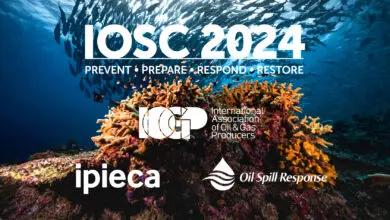Collaboration, commitment and decarbonization: Supporting Egypt’s oil and gas industry in their path to net zero
By Concetto Fischetti, IOGP Energy Transition Director

With COP27 on the horizon, all eyes are on the oil and gas sector and our vital role in delivering net zero and the energy transition. Both subjects are top of our agenda and with them in mind I had the pleasure of attending an IOGP workshop hosted by the Egyptian General Petroleum Corporation (EGPC) last month.

We worked on an action plan for the road to net zero and the energy transition, sharing knowledge and learnings from the industry journey so far.
I wanted to share my three biggest takeaways.
Commitment is key
For industry at large to successfully decarbonize, the oil and gas industry needs to lead by example. We have both the technical expertise and financial strength to execute effectively but we need to commit to action. Commitment from government and global regulatory bodies will also be just as important. Policy and regulatory support have a huge role to play, and will also help facilitate even more financial investment, which is needed for bigger infrastructure projects. It was great to see the eagerness from EGPC to take the lessons learnt on board and put them into action, showing the attitude we need to keep to our decarbonization road map.
We must be willing to share and adopt best practices
There are many long-lived organizations in the oil and gas industry with a great depth of experience. And while this brings some cooperation across the sector, it has also brought fixed practices. Yet for the industry to effectively progress, many need to be improved.
There are two ways that IOGP is working to facilitate the improvement.
Firstly, in developing the energy transition framework which builds on the foundational work done by IOGP’s Member Companies and outlines crucial first steps for the energy transition, based on four disciplines:
- Carbon capture transportation storage
- Flaring and venting
- Energy efficiency
- Electrification
Secondly, we launched several task forces last September with a range of engineering and operational subject experts in the four key disciplines. These task forces consolidated a list of lessons learned from early low carbon projects and are currently drafting recommended practices and technical guidelines for operators in the design, execution, and operation of low carbon investment, due to be published this autumn.
It was encouraging to see how receptive the attendees were to initial recommendations during the workshop, and we hope the guidelines are similarly valuable.
Standardization and knowledge sharing are crucial
One of the key challenges to the decarbonization of oil and gas operations is the lack of standardization. This is a gap that IOGP is trying to fill, and workshops like that in Egypt that can help the network of oil and gas producers focus on consistent consumption targets, approaches to low carbon projects and broader best practice.
However, IOGP can only do so much. It is up to the attendees and to the industry to share this knowledge across their networks and to ensure they become industry standards.
The workshop saw intense discussion and produced an action plan for the Road to Net Zero that EGPC will pursue over the coming months and I was pleased to see their willingness to share this roadmap with key Egyptian stakeholders.
I also believe that any good project needs clear milestones to mark progress against. For the oil and gas industry, this means ensuring decarbonization projects are consistently mapping out the trajectory of emissions reductions to ensure they are working towards clear targets.
With the collaboration, knowledge sharing and willingness to implement standardization that I saw in Cairo last month, I am hopeful that by the time we convene in Egypt once again, we will see more progress to celebrate.



